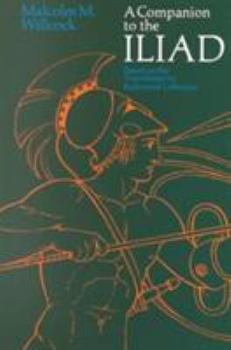A Companion to the Iliad
Select Format
Select Condition 
Book Overview
Those who are able to read Homer in Greek have ample recourse to commentaries, but the vast majority who read the Iliad in translation have not been so well served--the many available translations contain few, if any, notes. For these readers, Malcolm M. Willcock provides a line-by-line commentary that explains the many factual details, mythological allusions, and Homeric conventions that a student or general reader could not be expected to bring to an initial encounter with the Iliad. The notes, which always relate to particular lines in the text, have as their prime aim the simple, factual explanation of things the inexperienced reader would be unlikely to have at his or her command (What is a hecatomb? Who is Atreus' son?). Second, they enhance an appreciation of the Iliad by illuminating epic style, Homer's methods of composition, the structure of the work, and the characterization of the major heroes. The "Homeric Question," concerning the origin and authorship of the Iliad, is also discussed. Professor Willcock's commentary is based on Richmond Lattimore's translation--regarded by many as the outstanding translation of the present generation--but it may be used profitably with other versions as well. This clearly written commentary, which includes an excellent select bibliography, will make one of the touchstones of Western literature accessible to a wider audience.
Format:Paperback
Language:English
ISBN:0226898555
ISBN13:9780226898551
Release Date:May 1976
Publisher:University of Chicago Press
Length:302 Pages
Weight:0.81 lbs.
Dimensions:0.6" x 5.3" x 8.0"
Customer Reviews
3 ratings
A Companion to the Iliad by M M Willcock
Published by Thriftbooks.com User , 14 years ago
Malcolm M Willcock's brilliant "Companion" is based on Lattimore's translation which follows the Greek translation line by line; making Lattimore's translation closest to what Homer intended. An example of Willcock's notes: "angry arrows" were usually dipped in poison. Between Lattimore and Wilcock, it took me three months (two to three hours a day) to read the 24 Books of "The Iliad." [Yes, I am a slow reader.] This intense immersion may not be for everyone. But, trust me, the compliment is well-deserved.
Unreserved Praise for Wilcock's Helpful Guide
Published by Thriftbooks.com User , 17 years ago
I have used this handy guide for over twenty years. I just had to get another one because I gave my first copy to the teacher who replaced me when I retired. It is keyed to the Lattimore translation of the Iliad, and addresses many scholarly and linguistic issues that can be problems when teaching the epic. The first-time reader of Homer can profit from the book as well, but its primary value seems to be for the teacher or the advanced student.
Thorough commentary
Published by Thriftbooks.com User , 20 years ago
Though not for the impatient, this companion to Lattimore's translation of the Iliad is quite accessible to the non-specialist. Difficult passages are explained by making reference to archaelogical and linguistic evidence, other ancient texts (including the scholia and the Odyssey), and recent research on the transmission of oral literature. The reader is thus better able to place this seminal literary work in its proper context. Willcox helps us understand the cultural, political and human forces that shaped the Iliad during the centuries it was an oral poem, and the slight variations it probably underwent once committed to the written word. Overall, an outstanding work of scholarship.





